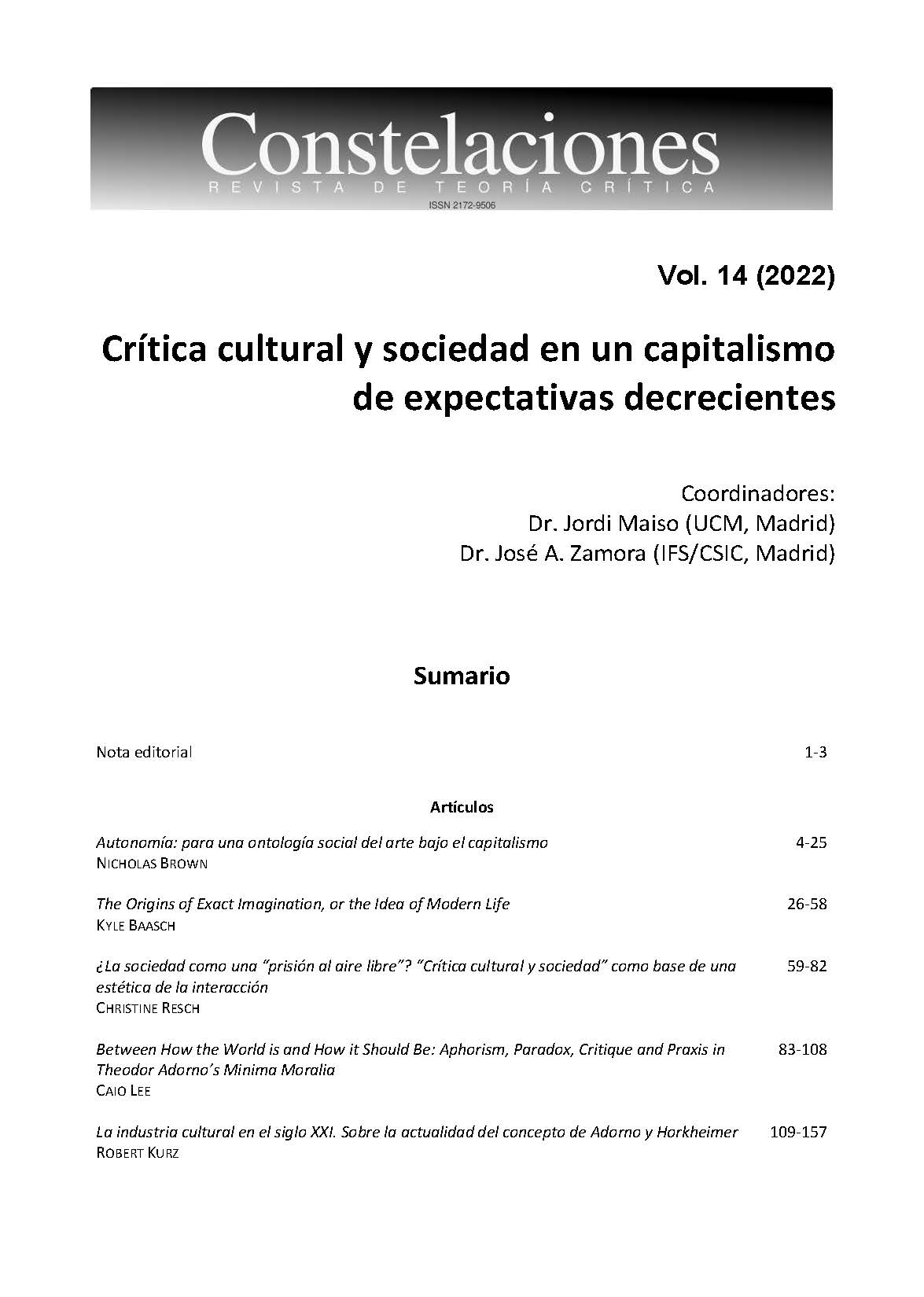Verdadera reproducción del pasado reciente. Glenn Gould como crítico del neoliberalismo
Keywords:
Glenn Gould, reproduction of music, interpretation, criticism of neoliberalism, dereification, cultural critique, aestheticsAbstract
The text is dedicated to musical reproduction by Glenn Gould against the neoliberal omnipotence of the culture industry. The ambivalences and tearing contradictions of neoliberalism can be revealed through his playing. From today's perspective, Gould's specific playing and his position on public, now medialized musical life reveal expressive characters of that epoch of which Gould was a contemporary and which has now passed. Drawing on Thodor W. Adorno's unfinished theory of musical reproduction, the content of the latter is actualized precisely by making its motives speak in Glenn Gould's playing. For the interpretation of Gould's music reproduction, the neoliberal sedimented relationship between pop music and classical music as well as their respective critique are outlined. At the center of the text itself is Gould's subjectivistic activity of reproduction, as expressed in his interpretation and in his withdrawal from concert life. Gould's interpretation of Beethoven's Op 14/2 shows the historical process of decay of bourgeois progress precisely by means of the neoliberally decaying subject and thus once again lets the objective cheerfulness of the bourgeois hope for emancipation ring out. In Gould's specific position on the musical tradition that has been handed down - his family imprint, Schönberg’s ideal of interpretation, the concert situation - it becomes clear to what extent Gould, based on the demands of modernity, gained a binding character from the beginning of postmodernism, which once again and really re-echoes the truth content of sounding subjectivism.
Downloads
References
ADORNO, Th. W. (1929): “Nachtmusik”, en Gesammelte Schriften, (Vol. 17), Fráncfort: Suhrkamp, 1982: 52–59.
ADORNO, Th. W. (1942): “Reflexionen zur Klassentheorie”, en Gesammelte Schriften, (Vol. 8), Fráncfort: Suhrkamp, 1972: 373-391.
ADORNO, Th. W. (1949): Philosophie der neuen Musik, en Gesammelte Schriften, (Vol. 12), Fráncfort: Suhrkamp, 1975.
ADORNO, Th. W. (1951): Minima moralia. Reflexionen aus dem beschädigten Leben, en Gesammelte Schriften, (Vol. 4), Fráncfort: Suhrkamp, 1979.
ADORNO, Th. W. (2001): Zu einer Theorie der musikalischen Reproduktion, Fráncfort: Suhrkamp.
BAZZANA, Kevin (2004): Wondrous Strange: The Life and Art of Glenn Gould, Yale: Yale University Press.
BEAUCHAMP, Richard (2005): Glenn Gould and Finger Tapping”
https://www.musicandhealth.co.uk/articles/tapping.html
GOULD, Glenn (1962): “Let’s Ban Applause!”, en T. Page (ed.): The Glenn Gould Reader, Nueva York: Alfred A. Knopf 1989: 245–249.
GOULD, Glenn (1966a): “Prospects of Recording”, en T. Page (ed.): The Glenn Gould Reader, Nueva York: Alfred A. Knopf 1989: 331–352.
GOULD, Glenn (1966b): Interview with Alex Trebek: "I detest audiences", Intertel: The Culture Explosion (9.11.1966) (OFFICIAL):
https://www.youtube.com/watch?v=1nZTgAGSajA
GOULD, Glenn (1974): “Glenn Gould Interviews Glenn Gould About Glenn Gould”, en T. Page (ed.), The Glenn Gould Reader, Nueva York: Alfred A. Knopf 1989: 313–330.
GOULD, Glenn (1997): Briefe, Múnich: Piper.
HAUSER, Arnold (1953): Sozialgeschichte der Kunst und Literatur. 2 Tomos, Múnich: Beck.
HAUSER, Arnold (1974): Soziologie der Kunst. Múnich: dtv.
HAUSER, Arnold (1979): Der Manierismus. Die Krise der Renaissance und der Ursprung der modernen Kunst. Múnich: dtv.
HORKHEIMER, Max (1943): “Zur Soziologie der Klassenverhältnisse”, en: Gesammelte Schriften (Vol. 12: Nachgelassene Schriften 1931-1949), Fráncfort: Fischer, 1985: 75–104
HOBSBAWMS Eric J. (2008) “Why American Hegemony Differs from Britains’s Empire”, en Globalisation, Democracy and Terrorism, Londres: Abacus: 49–71
KAISER Joachim (1984): “Glenn Gould”, en: Klaus Stadler (ed.): Lust an der Musik. Ein Lesebuch. Múnich: Piper: 259–270.
MARX, Karl/ENGELS, Friedrich (1848): “Manifest der Kommunistischen Partei”, en Werke. Vol. 4. Berlin: Dietz, 1959: 459-493.
MARX, Karl (1857): “Einleitung [zu den Grundrissen der Kritik der politischen Okonomie]”, en K. Marx/F. Engels, Werke Vol. 42, Berlin: Dietz, 1983: 15-45.
METZGER, Heinz-Klaus (1961): “Die geschichtliche Wahrheit des musikalischen Materials”, en Id.: Musik wozu. Fráncfort: Suhrkamp, 1980: 137–144
METZGER, Heinz-Klaus (1962): “Über Schallquellen”, en Id.: Musik wozu. Fráncfort: Suhrkamp, 1980: 220–228
METZGER, Heinz-Klaus (1970): “Die Organische Zusammensetzung der Musik”, en Id.: Musik wozu. Fráncfort: Suhrkamp, 1980: 229–243
METZGER, Heinz-Klaus (2003): Interview mit Björn Gottstein
http://www.geraeuschen.de/22.html
POHRT, Wolfgang (1974): “Nutzlose Welt”, en Werke, Vol. 1: Theorie des Gebrauchswerts, Wissenschaftstheorie & Seminararbeiten, Texte 1969–1980, Berlín: Tiamat, 2020: 17–55.
SCHERNIKAU, Ronald M. (2009): Die Tage in L. darüber, daß die ddr und die brd sich niemals verständigen können, geschweige mittels ihrer literatur. Hamburgo: Konkret Literatur.
SENNETT, Richard (2000): The Corrosion of Character: The Personal Consequences of Work in the New Capitalism. New York: WW Norton.
STEDEROTH, Dirk (2012): “Kulturindustrie und Musik. Willkommen im ‘Haus of Gaga’”, Zeitschrift für kritische Theorie, 34/35: 69-81.
SEIWERT, Elvira (2017): Enthüllungen. Zur musikalischen Interpretation im Zeitalter ihrer technischen Reproduzierbarkeit. Springe: zu Klampen Verlag.
Downloads
Published
How to Cite
Issue
Section
License
Copyright (c) 2022 Leon Ackermann, Arne Kellermann

This work is licensed under a Creative Commons Attribution-NonCommercial-ShareAlike 4.0 International License.
Authors who have publications with this journal accept the following terms:
1. Authors will retain their copyright and grant the journal the right of first publication of their work, which will be simultaneously subject to the License of recognition of Creative Commons CC BY-NC-SA 4.0 that allows third parties to share, redistribute and adapt the work provided it is for non-commercial purposes and its author and first publication in this journal is indicated.
2. Authors may adopt other non-exclusive distribution license agreements for the version of the published work (e.g., depositing it in an institutional electronic archive or publishing it in a monographic volume) provided that the initial publication in this journal is indicated.
3. Authors are permitted and encouraged to disseminate their work via the Internet (e.g., in institutional telematic archives or on their website) before and during the submission process, which can produce interesting exchanges and increase citations of the published work. (See The Effect of Open Access).
Data confidentiality
1. Constelaciones. Revista de Teoría Crítica guarantees that the data you send us will only be used to meet the requests made in this message.
2. Your data will not be passed on to third parties.
3. You may request that your data be removed from our records at any time.





